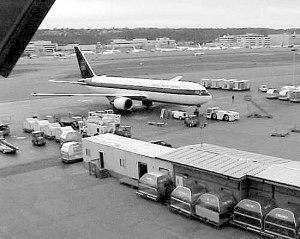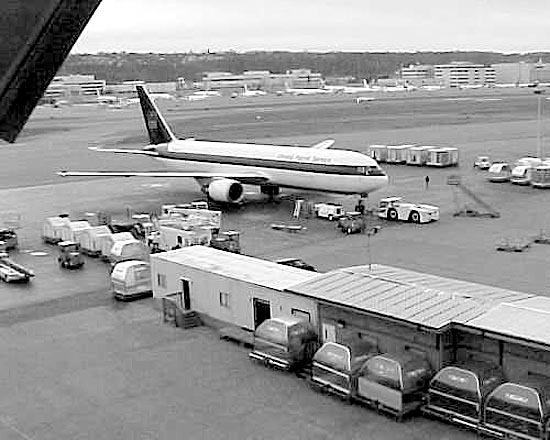By Michael Colmant, Assistant Airport Director
Since the mid 1980S, air cargo has been the fastest growing segment of the aviation industry. From 1985 to 2000, air cargo grew at an average annual rate of 7.3 percent worldwide. An increasing population and strong economy were the principle factors that allowed the Puget Sound Region-Seattle-Tacoma International and King County International Airport/Boeing Field-to match this growth rate. During the same period, air cargo grew locally by 180 percent-an average of 7 percent annually.
The effects of economic downturn and terrorist actions in 2001 combined to halt that growth, creating a decline in cargo activity in the United States. Again, the Puget Sound region mirrored this trend. Boeing Field’s total cargo shipments declined by approximately 21 percent for the one-year period 2000 to 2001.
Boeing Field is served by three national cargo airlines-UPS, DHL/Airborne Express and BAX Global-as well as numerous regional carriers that provide feeder service. Combined, these companies generate approximately 500 operations weekly, ranking Boeing Field 35th nationally in terms of total landed weight. A wide range of aircraft are used to serve the airport, from B-767s, DC-8s, B-747s to Piper Chieftains and Navajo aircraft, to name a few. The relatively large number of operations, large mix of varying sized aircraft, the limited airport land area, and narrow operating window all combine to make for challenging conditions for all involved. Ramp congestion, runway access and egress, and schedule performance are the primary challenges faced daily.
So why is Boeing Field an important gateway in the Puget Sound region? Firstly, its proximity to Seattle city center and surrounding cities provide for an efficient ground-air cargo interface. Secondly, as an airport with few passenger operations, Boeing Field affords cargo businesses relative ease of access. A low level of passenger activity means less traffic congestion, with fewer vehicles traveling to/from the airport, which assists on-time performance.
As one might expect, the list of goods shipped by air is extensive. Virtually anything that is time sensitive can be shipped worldwide in dedicated cargo or passenger/cargo combination aircraft. Typical items include documents, manufactured goods and personal items of all kinds. Specialty items shipped from Boeing Field include perishable food items such as clams, peaches and cherries. Other unique goods include flowers and banking documents, and occasionally large specialty cargo aircraft visit carrying aircraft engines for installation on other commercial airplanes.
A more regular specialty shipment occurs annually in summer and involves central Washington cherries. Newly harvested cherries are trucked to Seattle each June and July, and transferred into air cargo containers. From there, the containers are loaded onto aircraft for shipping to Taipei. Each shipment is sold in Taipei within two days of harvest. This year, 35 tons were shipped from Boeing Field worldwide.
For smaller shipments, time sensitivity is best met using a system of feeder aircraft that “feed” larger cargo aircraft, on a just-in-time basis. This allows customers to have the latest possible pick-up at their door, together with the earliest possible delivery. Use of feeder aircraft to support large cargo operations greatly expands the range of effectiveness for delivery companies. Without feeder aircraft, smaller communities would be reliant entirely on ground transportation to get their shipments to Seattle for distribution by air.
Peak season cargo activities occur at the end of each calendar year coinciding with the holiday season. Cargo shipments and associated flight activities increase following Thanksgiving, with manufactured goods and holiday gifts being the principle goods shipped. Freight volume increases significantly as December 25 approaches. UPS, for example, increases its flights from six to 10 daily in order to satisfy peak holiday demand.
The air cargo and commercial passenger service segments of the aviation industry continue to recover from 2001 events. Again, the cargo activities in the Puget Sound region reflect this trend. While opportunities for significant growth in this segment are very constrained at Boeing Field due to the small airport land mass, lack of land available for development, and height restrictions on existing airport properties, the airport is bouncing back.
The 2003 Airport Economic Impact Study identified over 550 people employed at the airport in cargo and airline jobs, generating almost $107 million in sales. King County International Airport/Boeing Field is expected to continue to play an important role in meeting this region’s air cargo needs.
The Puget Sound Regional Council has recently commissioned a study to identify future demand for air cargo in the region, and identify possible alternatives for meeting this demand. A preliminary report is expected next year.
So, whether its cherries on their way to Taipei, parts for the latest local high-tech innovation, or a last minute gift ordered on-line, there is a real possibility that a short transfer to or from an aircraft at Boeing Field might be involved. King County International Airport is keeping an eye to the future to meet the cargo needs of both businesses and consumers.











